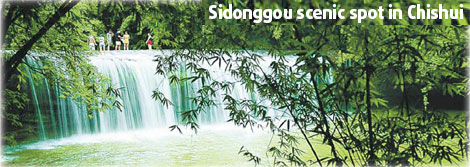
|
CHINA> Charming Huangguoshu
 |
|
Liquor and water flow freely in Guizhou culture
(China Daily)
Updated: 2009-09-23 19:33 Alcohol plays an important role in the lives, livelihood and social activities of many of the inhabitants of southwest China's Guizhou province.
 Alcohol is more than a beverage to Guizhou people. It is an important carrier of the province's long history and culture, both of which are unique in China largely due to its ethnic minorities - which have their own diverse customs and rituals related to alcohol. In the southeast of Guizhou, the Miao group uses alcohol to express their warmth, friendliness and hospitality to guests. When visiting a family, a guest is expected to drink without a break two cups of alcohol first served by the husband first. The wife and daughters will then take turns to propose toasts to guests, holding earthen containers filled with alcohol. If the family wants to persuade the guests to stay longer the ladies will try to get the most distinguished guest drunk so other guests have to stay. The Buyi ethnic group has a special custom of sharing guests within a village. When one family has guests coming, the whole village will regard them as their own guests, who are invited to all the households in the village to drink alcohol. Some ethnic groups in Guizhou have a tradition of proposing toasts to guests by blocking their way to a village. The Miao group can set up as many as 12 blocking passes to "stop" guests and persuade them to drink alcohol. Guests who are not big drinkers should remember not to touch the cups proposed by ladies with their hands, as touching cups means the guests have to drink the whole cup of alcohol according to the Miao custom. When guests say goodbye to their host families of the Miao group in southeast Guizhou, they will also receive toasts of alcohol from the families. The hosts will sing folk songs to departing guests while proposing toasts, which is a sincere expression of their reluctance to see the guests off. They sing songs all the way to the gate of a village, where they will persuade the guests to drink the final cup of alcohol. If the guests are distinguished, the whole village will hold ceremonies to see them off. Colorful flower necklaces will be given when they say goodbye. As is well known, Guizhou is flowing with alcohol. In addition to Moutai, regarded by many as China's national alcohol, the province has many other spirits from the Miao people, as well as the brands Dong, Xi, Guizhouchun, Zhuchang and Jinshajiao. World-renowned Moutai is brewed in the town of the same name, where the climate and vegetation contribute to its fragrance and taste. Moutai Liquor first gained international fame when it won a gold medal at the 1915 Pan-Pacific Exposition in San Francisco. Mao Zedong served Moutai at state dinners during Richard Nixon's state visit to China in 1972. His Secretary of State Henry Kissinger remarked to Deng Xiaoping that "if we drink enough Moutai we can solve anything". It is the only alcoholic beverage presented as an official gift by Chinese embassies in foreign countries. The Meijiu - or Mellow Liquor - River that runs through the town of Moutai is famous as a water source for a range of other liquors including Jinjianglang, Shenjiaolao and Xiaohutuxian. The 484.5-km-river flows through Guizhou and Sichuan provinces along its fill course. Chishui Scenic Spot Located in northwest Guizhou, Chishui is famed in China as the site where the Red Army won a crucial battle under the leadership of Mao Zedong in 1935. Today, Chishui has become a national scenic spot for its well-preserved natural environment. Tourists to Chishui can enjoy magnificent views of grand waterfalls, seas of bamboo, remote valleys, dense forests, rare plants and picturesque Danxia landforms. Shizhangdong Falls, 38 km from the city of Chishui, is a breathtaking scenic spot. Many tourists say the 72-m-high, 30- to 60-m wide waterfall is as magnificent as the Huangguoshu Falls, China's largest.
|